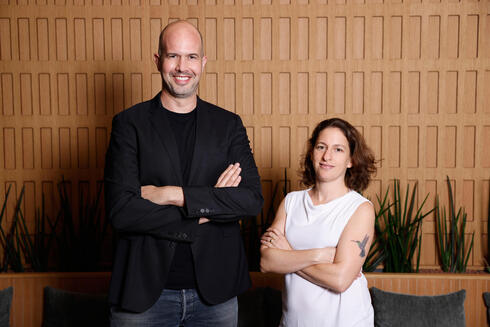
Tech leaders launch initiative to train 10,000 employees from under-represented populations
Palo Alto Networks, Insight Partners, and executives from across the high-tech industry are establishing a new platform for recruiting and training employees with the goal to train 10,000 workers from sectors that suffer from underrepresentation in the industry
A new platform for recruiting employees for the high-tech industry is currently being established in Israel with the involvement of some of the most senior executives in the field, Calcalist has learned. The platform, which will be called PLACE-IL, aims to provide a solution to the problem of the shortage of high-tech workers on the one hand and on the other allow populations that suffer from underrepresentation in the industry to integrate into it, as well as introduce more junior workers (young programmers) into the industry.
The American venture capital fund Insight Partners, which is very active in investments in Israeli technology, will be a strategic partner in the initiative and among its financiers. Additional funding will come from the partner companies, primarily Google, monday, Cisco, Armis, Palo Alto Networks, Riskified and Axonius. All these companies will not only participate in the financing of the activity, but also commit to a certain number of interns who will be integrated into their development teams from among the target population that PLACE-IL addresses.
Along with the companies, Israeli funds Viola Ventures, Vertex Ventures and Elron Ventures will also be partners in the initiative. The advisory team includes Liad Agmon, a Partner in Insight; Gigi Levy-Weiss, General Partner at the NFX fund; Michael Eisenberg, Equal Partner in the Aleph fund; the founder of Palo Alto Networks, Nir Zuk; the co-founder and CTO of Armis Security, Nadir Izrael; HiBob's founder and CEO, Ronni Zehavi, Nataly Kremer, CEO of AT&T Israel; and the former Director General of the Ministry of Justice, Emi Palmor.
All the partners have already poured several million shekels into the initial activity of the project, which will include the formulation of identification and sorting processes for underrepresented populations. In this framework, a kind of assessment center for the high-tech professions will be established after the companies formulate together the appropriate tests that will not necessarily be in the format accepted today of puzzles or a two-hour test for writing code. At the same time, the platform will act as a meeting place or, in its high-tech name, a "marketplace" that will enable a connection between candidates and the technology companies looking for employees.
Behind the initiative is Idan Tendler, an executive at the cyber giant Palo Alto Networks, which acquired his startup Bridgecrew for $200 million last year. At this stage, the platform will operate as an association headed by Keren Halperin-Musseri, who was previously the CEO of the Shiur Acher (A different lesson) association. The purpose of the platform is to formulate new screening processes for the industry, which will not only appeal to graduates of the IDF’s technology units, but will also allow for candidates from among the Arab, ultra-Orthodox, Druze and Ethiopian sectors to express their abilities in tests accepted today in high-tech companies.
The platform will connect to the various vocational training and retraining bodies that operate with government or philanthropic funding in order to gather all candidates under one roof and allow high-tech human resources organizations to have easy and convenient access to a new pool of candidates. Candidates who pass the search and selection process will be integrated into one-year internship programs, during which they will receive a salary. According to the plan, each company will take in interns for a period of three months at least. Each company that participates in the program has committed to a minimum number of interns who will be integrated into its development teams every year.
"When I returned to Israel after seven years in San Francisco, the gaps between those involved in the high-tech industry and those outside it were very noticeable to me. Israel is going through a process of Californiazation, where you can spend an entire life without seeing people who are not in high-tech," Tendler told Calcalist. "The momentum of high-tech does not reach everyone, and if we want it not to be just a locomotive, but also the engine of the entire Israeli economy, the reality must change. On the other hand, there is a shortage of 20,000 workers in high-tech, which is not affected by the recent cuts in the industry. It continues to grow. And there is a lack of workers. So if we don't find them in Israel, the projects along with the jobs will flow abroad and with them also significant assets that were built here."
Tendler describes that his activity began as a one-off initiative to diversify the workforce within Palo Alto Networks, which employs approximately 700 workers in Israel, but he saw that it is impossible to do it alone and requires the involvement and commitment of the entire industry. "There are many niche and specific initiatives and quite a few employee training programs from various sectors funded by the government or by philanthropists, but in the end they are only resulting in bottlenecks in the final stage of being hired by companies. The industry itself does not know how to reach these employees. Human resources departments want to diversify the employee population, but they don't know where to start. Unlike the many initiatives in the field that have existed until now, the current platform is the first organized and institutionalized initiative on the part of the high-tech companies themselves, and therefore I believe that this time it can succeed unlike in the past."
As befits startups, Tendler and his partners have big dreams and goals that sound quite imaginative. "Our goal is that within two years, 10,000 people from the populations that are underrepresented today will enter the field," Tendler declares. "High-tech companies have never worked together to bring employees to them, but only competed head-to-head for talent."
Related articles:
The first step will be the construction of adapted tests: "Today high-tech companies send the candidate a task of writing code and they have two hours to do it. You cannot expect the same result from a graduate of the technological units in the IDF as a retraining graduate. The other group will also take the test, but will get two weeks to complete it. At the same time, the candidates will be accompanied by volunteers from high-tech companies. The idea is to develop a method for identifying talent similar to recruiting for military units," says Tendler. The second step will be to build an internship program in the American model of three months in each company, where the candidate will receive a project. After completing the first period, if the candidate does not stay at the same company, they will move to an internship at another company, until the candidate gains experience for a full year.
The first pilot has already gotten underway, with the first hundreds of candidates going through selection processes and within a few weeks they will start the internship programs. To date, most of the efforts to diversify the population of high-tech workers have not borne fruit and the proportion of the Arab, ultra-Orthodox, Druze and Ethiopian population in high-tech is estimated at only 4%. Nataly Kremer, CEO of AT&T Israel, told Calcalist that, "There are many plans and attempts to diversify employees in high-tech through the integration of the various populations, but this is the first time that the initiative comes from within the industry itself. The entire industry is building something real here that includes a deep commitment to investing in interns. This is a significant and dramatic difference compared to the other programs."

